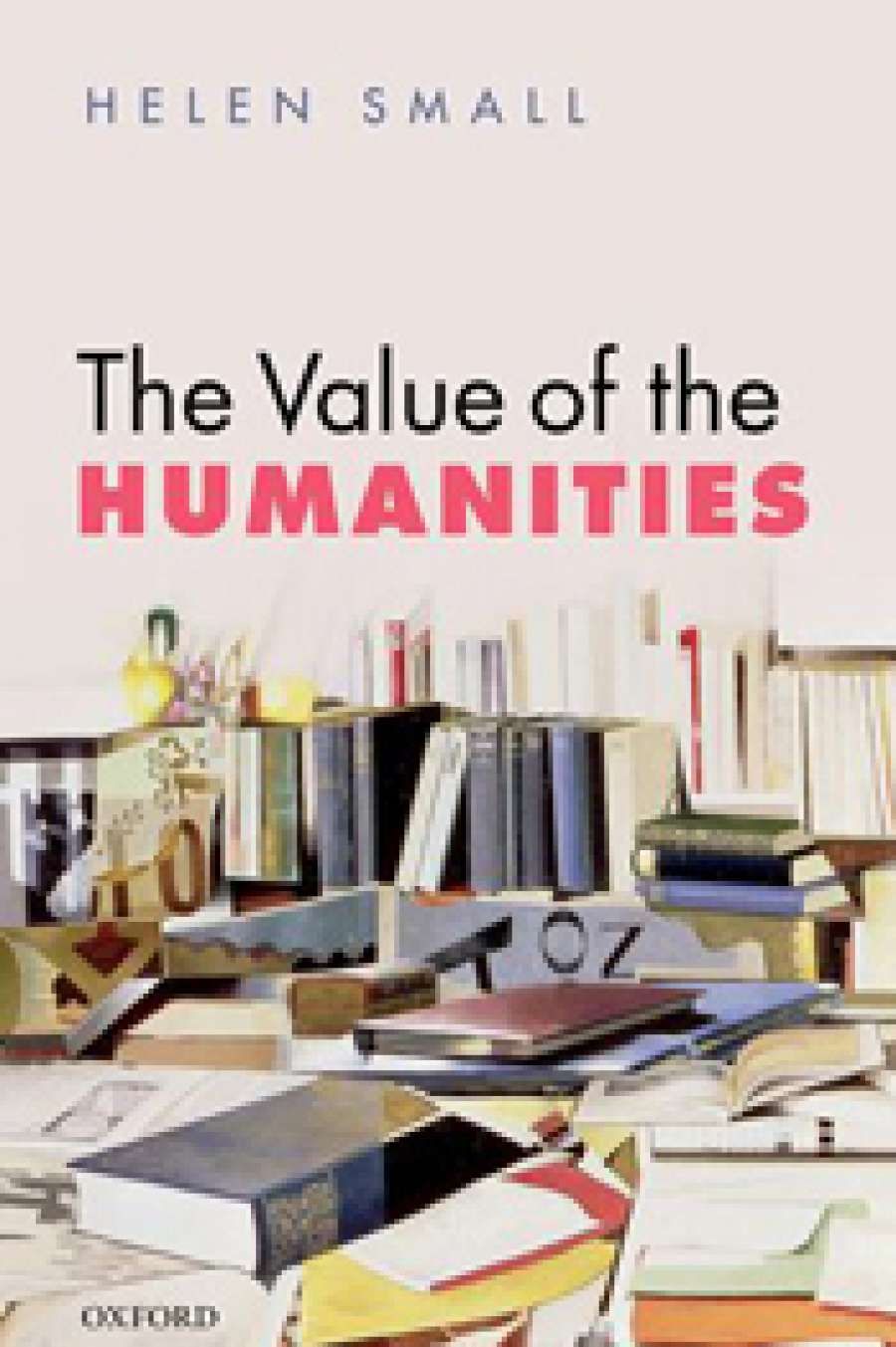
- Free Article: No
- Contents Category: Education
- Review Article: Yes
- Article Title: What we're up to
- Article Subtitle: Valuing the Humanities
- Online Only: No
- Custom Highlight Text:
Helen Small, Professor of English at Pembroke College, Oxford, adopts a pragmatic and non-polemical approach in addressing The Value of the Humanities. This topic has been much debated recently as political and economic pressures on universities and funding agencies have led to an alleged devaluation of the humanities.
- Book 1 Title: The Value of the Humanities
- Book 1 Biblio: Oxford University Press, $38.95 hb, 212 pp, 9780199683864
- Book 1 Readings Link: booktopia.kh4ffx.net/n1xYG7
Stefan Collini’s What are Universities For? (2012) captured the angst of many British academics at the increasing corporatisation of universities, including, as Small notes, ‘the now familiar pressure to justify expenditure on educating students in the humanities in the face of resistance from many political economists’.
None of this is exactly new. In 1241, John of Garland, at the University of Paris, commented, ‘The lucrative arts, such as law and medicine, are in vogue and only those things are pursued which have a cash value’. John McManners, in The Future of the Humanities in the Australian Universities (1965), said that the humanities should be ‘realistic about money’ and ‘planning must be conservative’.
Small deliberately avoids the passionate advocacy of Martha Nussbaum in Not For Profit: Why Democracy Needs the Humanities (2010), in which Nussbaum argues that education has become increasingly focused on ‘producing a greedy obtuseness and a technically trained docility that threaten the very life of democracy itself’. Small hopes that her own arguments ‘may improve the way “we” as a society debate the public good of the humanities’.
The author’s approach is taxonomic and pluralistic in discussing the pros and cons of five claims for the value of the humanities: that they ‘study the meaning-making practices of the culture’ and their ‘distinctive understanding of what constitutes knowledge’; that they are ‘useful to society in ways that put pressure on how governments commonly understand use’; that they contribute to individual and collective human happiness; that they have ‘a substantial contribution to make to the good working of democracy’; and that they ‘matter for their own sake’.
Small tests her arguments within current and historical, particularly Victorian, and philosophical frameworks. She examines, and extrapolates from, the writings of John Stuart Mill on happiness, Matthew Arnold on ‘graduated usefulness’, and Cardinal Newman’s idea of a university, where ‘the intellect may safely range and speculate’.
The chapter ‘Socrates Dissatisfied’ probes the humanities role in ‘our understanding of happiness’. If happiness is to be related to employment, research commissioned by Oxford University’s Humanities Division, Humanities Graduates and the British Economy: The Hidden Impact (2013) showed that Oxford humanities graduates played a large and growing role in those employment sectors which brought about growth in the UK economy from 1960 to 1989. Humanities graduates thus prosper, not only financially, but in the widest sense of that word.
The Value of the Humanities is an important vade mecum, although the intended audience is just as much a political and public one as for practitioners in the humanities. Those looking for a shorter version of Small’s arguments should seek out her Oxford web lectures and conference presentations. Small concluded one of her Oxford lectures with the advice ‘to keep optimism alive and cynicism in check’. Humanities scholars need to remain aware of public cynicism as their research becomes narrower and narrower, and enshrined in exclusive disciplinary language. Bill Gammage noted, in the February 2014 issue of the new online magazine Writers in Conversation, the absolute necessity for ‘Simplicity, economy, directness in historical writing ... a lot of academics write just for their colleagues’.
While sociology is not part of the humanities, the humanities disciplines are not immune from the language documented in the February 2014 ‘Cultures of Sense, Cultures of Movement’ conference, held at the Australian National University. Melbourne academic Candice Boyd’s abstract of her paper ‘Affective Geographies of Drain Art’, begins with ‘an argument in support of the “therapeutic-ness” of drain Art which draws on a Deleuzian-inspired ontology, valorising the affirmative in graffiti and urban play … This fundamentally geographical perspective also draws on post-phenomenological and process-relational loss, including notions of a de-centred subject.’
Oxford Professor of the History of the Church, Diarmaid MacCulloch, recently argued in The Oxonian Review that ‘The moral task of historians is to find a way of telling a wider public what we’re up to’. Evaluating the public impact of academic research, although not without generating controversy, is part of the 2014 UK Research Excellence Framework (REF). Humanities research as a public good, through focused definitions of value, has apparently been effectively demonstrated in the case histories for that exercise.
The British Academy’s February 2014 publication, Prospering Wisely: How the Humanities and Social Sciences Enrich our Lives, is an essential short supplement to Small’s book. Lord Stern, president of the British Academy, comments, ‘a society without thriving social sciences and humanities risks achieving at best only an arid kind of prosperity, far less rich than our creative human culture deserves’. One echoes those words in an Australian context.
David Willetts, Minister of State for Universities and Science in the United Kingdom, cited The Value of the Humanities as one of his 2013 books of the year. It is to be hoped that Christopher Pyne will follow suit in 2014. The Value of the Humanities – a stimulating, unemotional, closely argued book – seeks to shift the debate away from overly negative criticisms of government policies and to adopt a reflective and measured approach to the issues.


Comments powered by CComment